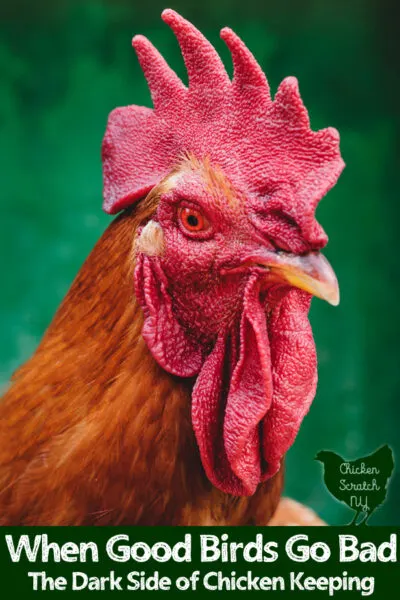
Show quality strains may have even pigmentation throughout the outer plumage production or pet quality strains are likely to not. Its one of the reasons why waterers and feeders for chicks have red bases.

Instead these chickens are a lighter color of red that may also be seen in many other breeds as well.
Do chickens like the color red. Chickens are often attracted to the colour red. Thats why a bird with a bleeding wound should be separated from the others because they will peck it and make it worse. Then again they peck just about anything colourful and shiny.
Chickens like most birds clearly react to color. Bright red of comb wattles and head is associated with virility health. Dominant chickens doing chasing most likely to exhibit most red especially in males.
Your specific situation might involve prior interactions between your rooster and youngest daughter. Yes chickens do have a fixation with the color red and will peck red colored things excessively. This is because chickens are attracted to the color red.
Chicks will instinctively peck at anything and everything and if they happen to draw blood by accident pull out some fluff to expose pinkish skin or just irritate the skin that can lead to the others attacking that injured chick. Keep in mind that hens do not perceive red light as daylight. So adding such a bulb to your hen house will not work for increased egg production.
Because its not perceived as daylight chickens can be exposed to red light 247 with no ill effects. No chickens are not color blind. In fact they can see a wider range of colors than we can.
We have three types of cones in our eyes that see colors. Blue green and red and then variations of these colors. Chickens one-up us by having five cones.
The color of the comb can tell you a lot about the health of a chicken. A normal healthy comb will be red purple or black depending on the breed. A pullet that has not yet reached the point of lay may have a small pinkish one this is normal as her hormones have not yet started surging.
Its one of the reasons why waterers and feeders for chicks have red bases. The chicks are drawn to the red and investigate they find the food and water and start eating. Of course the continuation of using red is not necessary once the birds figure out where the food is but in the beginning its like a shining beacon to them.
Self chickens are one-coloured ie. Show quality strains may have even pigmentation throughout the outer plumage production or pet quality strains are likely to not. Red Cochin Bantam chickens have deep red feathers and tend to be very calm and friendly.
They are small compact chickens and have an abundance of feathers covering their legs. Red Cochin Bantams tend to be very broody willing to set on their own eggs and the eggs of other chickens. The short answer is yes chickens see color.
The longer answer is complicated science geeks continue reading here and here In fact chickens see a wider range of color than us. We have three cones which enable us to see red blue green and variations thereof. Chickens See Color Better Than Humans By Live Science Staff 17 February 2010 Chicken farms may be in part responsible for the rapid merging of two different Campylobacter bacteria species.
These nontoxic dyes are gentle enough for people to eat and theres no evidence that they do any harm to developing chicks. If you have a food dye thats stronger than a 2-3 solution dilute it with a little water. You can use any color you want but red green and blue typically show up the best.
In a few lucky instances its possible to instantly tell the gender of a chick based on color. Male Rhode Island Reds and New Hampshire chicks have a white spot on the down over the wing web this spot is lost when the chicks feather out. Sexing by this spot color is not always accurate because of the spots size variations.
Instead these chickens are a lighter color of red that may also be seen in many other breeds as well. In particular a lot of hybrid birds have this lighter buff red color. And the underfluff of the commercial strains could be red gray or white.
Other notable features of Rhode Island Red chickens. The health of a backyard chicken can often be determined by the color of her comb. Monitoring your flocks health can often be as easy as watching their combs.
A chickens comb is an external indicator of chicken health overall condition and most importantly her circulation. A healthy chicken will normally have a bright rosy red comb. They do not stick out like most animals do.
The ears are located inside of the head. The earlobe is just below the ear. It is a slight thickening of the skin and is smooth with no feathers.
Birds are the only animal that lay colored eggs. Popular folklore says that if a chickens earlobes are white they will tend to lay white eggs. The Rhode Island Red was accepted by the American Poultry Association in the early 1900s.
It is the result of breeding Malay chickens and brown Leghorn birds from Italy and also spent much of its early days on farms in Massachusetts. Rhode Island Reds get their color from the Malay chicken which has a luxurious deep red plumage. Types of Chickens that Lay Colored Eggs.
Here are a few common chickens breeds that are known to lay colored eggs. Named after the Araucana region of Chile where these chickens supposedly evolved the Araucana chicken lays gorgeous blue eggs.